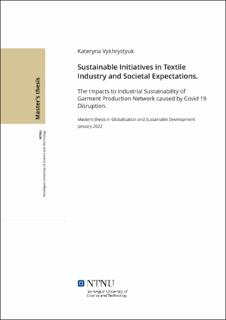| dc.contributor.advisor | Nilsen, Heidi Rapp | |
| dc.contributor.author | Kateryna Vykhrystyuk | |
| dc.date.accessioned | 2022-12-02T18:20:12Z | |
| dc.date.available | 2022-12-02T18:20:12Z | |
| dc.date.issued | 2022 | |
| dc.identifier | no.ntnu:inspera:116563288:64463146 | |
| dc.identifier.uri | https://hdl.handle.net/11250/3035708 | |
| dc.description.abstract | Avbruddet i den globale forsyningskjeden under covid19 har gitt næringene både: en mulighet til å revurdere bedriftens bærekraft og forbedre systemet; eller å overvinne krisen på bekostning av miljømessig og sosial bærekraft. Mens tekstilindustrien er ansvarlig for en enorm mengde CO2-utslipp, vannforbruk og avfall etter forbruk, er det avgjørende å undersøke hvilken vei selskapene valgte og hva som var deres begrunnelse og motivasjon.
Covid-19 har også økt bevissthetsnivået hos forbrukere, og derfor undersøker denne forskningen kriteriene og prioriteringene til plaggkunder som er spesielt interessert i bærekraftig anskaffelse av klær. For å finne det numeriske beviset for tendensene identifisert i intervjuene med interesserte kunder, ble det gjennomført tre spørreskjemaer rettet mot tre ulike kundegrupper. De identifiserte trendene inkluderer alternative tilnærminger fra bærekraftsorienterte kunder mot bærekraftig anskaffelse av plagg på grunn av en rekke hindringer som står overfor under bærekraftig anskaffelse av plagg.
Fra sammenligningen mellom kundekravene og bærekraftstiltakene til plaggsammenlikningene, er det tydelig at selskapene ikke samsvarer med bærekraftskravene til de bærekraftsøkende kundene. Det er imidlertid også tydelig fra funnene i årsrapportene at bevissthetsnivået for bærekraft øker i bransjen fordi en rekke greenwashing-tilfeller ble identifisert. | |
| dc.description.abstract | The disruption of the global supply chain during covid19 has provided the industries with both: an opportunity to reconsider the corporate sustainability and improve the system; or to overcome the crisis at the cost of environmental and social sustainability. While the textile industry is responsible for a vast amount of CO2 emissions, water usage, and postconsumer waste, it is crucial to investigate which path the companies chose and what was their reasoning and motivation.
The covid 19 also has increased the level of awareness within consumers, and thus this research investigates the criteria and priorities of garment customers who are specifically interested in sustainable clothes procurement. To find the numerical evidence for the tendencies identified in the interviews with interested customers, three questionnaires were conducted targeting three different groups of customers. The identified trends include alternative approaches from sustainability-oriented customers toward sustainable garment procurement due to a numerous obstacles faced during sustainable garment procurement.
From the comparison between the customer demands and sustainability initiatives of the garment comparisons, it is evident that the companies do not correspond to the sustainability demands of the sustainability-seeking customers. However, it is also evident from the findings in the annual reports that the sustainability awareness levels are rising within the industry because a number of greenwashing cases were identified. | |
| dc.language | eng | |
| dc.publisher | NTNU | |
| dc.title | Sustainable Initiatives in Textile Industry and Societal Expectations. | |
| dc.type | Master thesis | |
